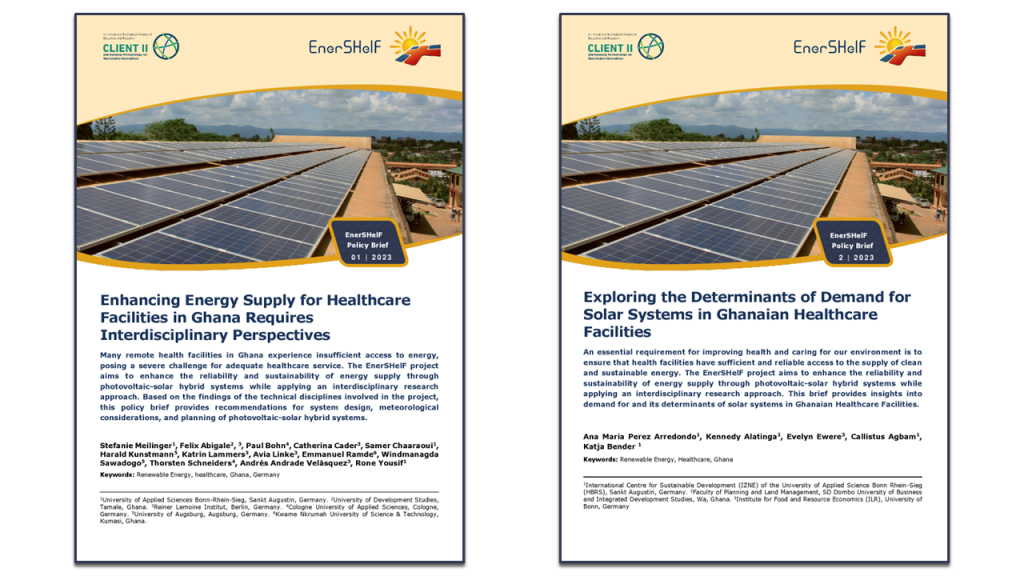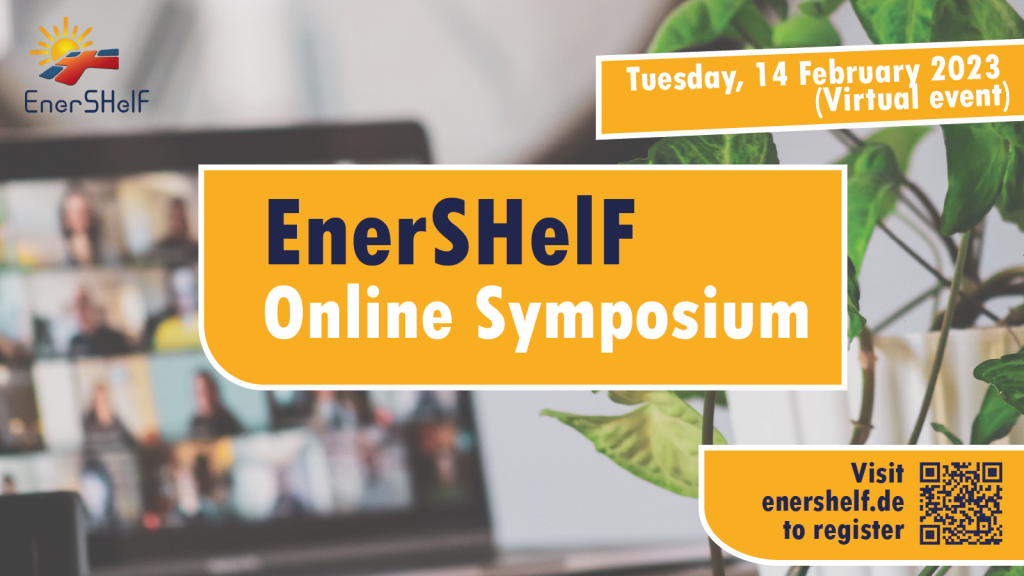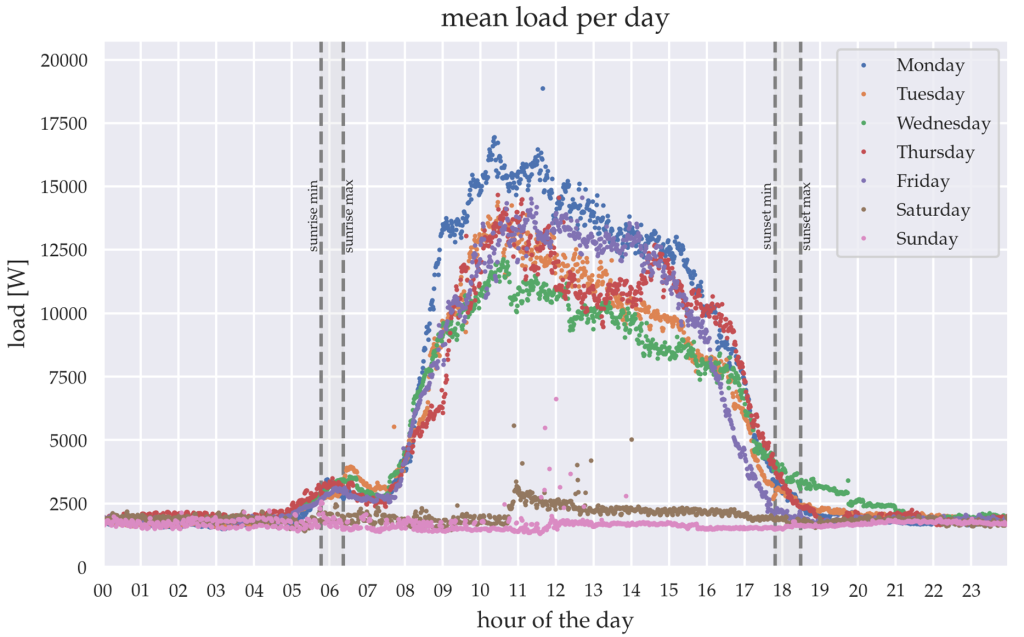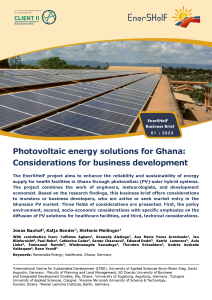All posts by Editor
Business Brief published
Click here to download our latest business brief:
Photovoltaic energy solutions for Ghana: Considerations for business development
EnerSHelF featured in Ghanaian Times
Two EnerSHelF policy briefs published

The EnerSHelF Project is finalizing its research results. In this process, two policy briefs have just been published. In a condensed form, they present findings and key recommendations derived from the research for relevant stakeholders and policy makers.
Enhancing Energy Supply for Healthcare Facilities in Ghana Requires Interdisciplinary Perspectives
In our first policy brief, our researchers grouped under work package 3 present an interdisciplinary, technical perspective on the requirements for enhancing energy supply for healthcare facilities in Ghana. The policy brief has different foci ranging from system design, meteorological considerations, and planning of photovoltaic-solar hybrid systems.
Exploring the Determinants of Demand for Solar Systems in Ghanaian Healthcare Facilities
Our second policy brief provides insights into demand for and its determinants of solar systems in Ghanaian Healthcare Facilities. The key insights and recommendations are based on 200 interviews conducted with health facility managers throughout Ghana. It unveils their perspectives on the potential of solar systems for healthcare services and their clinics.
Register now: EnerSHelF Closing Symposium

Tuesday, 14 February 2023 (Virtual event)
Since the project’s start in 2019, the team of EnerSHelF has been working on both technical and politico-economic questions to improve and disseminate marketable PV-based energy solutions for health facilities in Ghana. In March 2023, the project comes to an end, and we want to share our results and insights to stakeholders in the public and private sphere in our online symposium on
14th February 2023 10:00-15:00 CET.
Each individual work package will unfold their research with input from both our Ghanaian and German partners. The results are of interest to a broad audience, including researchers, private sector organisation, public authorities as well as international donor organisations working on either the expansion of Solar PV or on enhancing health services in Ghana and beyond. The registration link will direct you to the online registration via Webex where the symposium will be hosted.
Click here to download the agenda
Click here to register for the event
Insights into load profiles of Ghanaian health facilities

Continue reading Insights into load profiles of Ghanaian health facilitiesSamer Chaaraoui from the University of Applied Sciences Bonn-Rhein-Sieg is analyzing load data from the field sites of the EnerSHelF project. By analyzing the data, he can identify when and where electricity is used and what indication it has for planning PV-diesel hybrid systems for health facilities. In this article, he is given an insight into the identified load profiles and what they reveal. To ensure confidentiality, the load profiles have been anonymized.
The multifaceted contribution of Ghanaian project partners
Interview with Dr. Emmanuel Ramde from Kwame Nkrumah University of Science and Technology (KNUST), Kumasi, Ghana. He explains the many areas he is involved in for the EnerSHelF project
As an associated partner to the EnerSHelF project, the Brew-Hammond Energy Centre (TBHEC) at KNUST is involved in WP3.1, which aims to provide a power demand model for Ghanaian hospitals. What is your specific role within this work package?
My specific role within this work package is manifold and diverse. First of all, I use my knowledge and understanding of the energy landscape in Ghana to get the right input parameters for the expected outputs of the developed model. Furthermore, I liaise with the utilities to get data for some selected hospitals. That also included locating a health facility in Kumasi which is now a part of the EnerSHelF project as a pilot site. During this process, I initiated a collaboration agreement with the management of the facility and coordinated the recent installation of the weather station and of the load measurement devices.
Continue reading The multifaceted contribution of Ghanaian project partners
The market potential of photovoltaic in Ghana: Analysing institutional structures
Interview with Ana Maria Perez Arredondo from Bonn-Rhein-Sieg University of Applied Sciences. She explains how and why she examines institutional structures in Ghana and points out linkages of EnerSHelF to her doctoral thesis on One Health.
You recently joined work package 1 of the EnerSHelF project which is examining the political economy structure of Ghana. Can you explain your role within this work package?
Sure. I will be looking at how the dissemination of technology, particularly photovoltaic (PV), is happening in Ghana. In particular, I will interview managers of health facilities to evaluate the challenges they have in relation to energy supply and their impressions towards renewable and non-centralized energy sources. The goal is to evaluate the market potential for PV.
Continue reading The market potential of photovoltaic in Ghana: Analysing institutional structures
Interdisciplinary Exchange in the EnerSHelF project
Interview with Sarah Rabe from Bonn-Rhein-Sieg University of Applied Sciences. She talks about her role in the project as a linkage between the different disciplines, ensuring an active exchange among the work packages throughout the research process.
Interdisciplinarity is at the core of the EnerSHelF project as different academic disciplines and industrial partners are involved. What is the purpose of this holistic approach?
The holistic approach arises almost automatically out of the project’s topic. The technological transition towards renewable energy – in this case solar energy through photovoltaics (PV) – can only work if the product is of high quality and adapted to the specific region. But even well-engineered technology is pointless if it is not usable for or accepted by the people who are supposed to adapt it. Therefore, one needs different disciplines like engineering, meteorology, and socio-economy to tackle a holistic problem like the energy self-sufficiency of health facilities.
Continue reading Interdisciplinary Exchange in the EnerSHelF project
How Photovoltaic Solar Systems are Modeled
Interview with Samer Chaaraoui from Bonn-Rhein-Sieg University of Applied Sciences, Sankt Augustin, on the process of modeling photovoltaic systems. In cooperation with other members of the EnerSHelF project, he works on the mathematical representation of different effects and events that influence the operation of the system
When I searched for academic articles on solar photovoltaic modeling and simulation, I have seen a lot of equations and mathematical formulas. Can you explain in a more accessible way what modeling of photovoltaic systems encompasses?
By modeling photovoltaic (PV) systems, we try to find a mathematical representation of effects and events happening inside a PV system. With this representation, we can simulate processes, such as the conversion of solar radiation to electrical power, in order to estimate solar yields – for instance for economic and ecological business case analyses.
Since the full representation of the real world is not viable, we try to find mathematical representations which are simple enough to be calculated quickly and are complex enough to give an acceptable result. Therefore, it is especially important to validate modeling results with real world measurements, to estimate the performance of the model.
You will find many approaches and equations, trying to represent PV systems, which range from simple physical equations to more complex methods. Each of these approaches result from different demands towards the use case, usability, and accuracy of the model.

